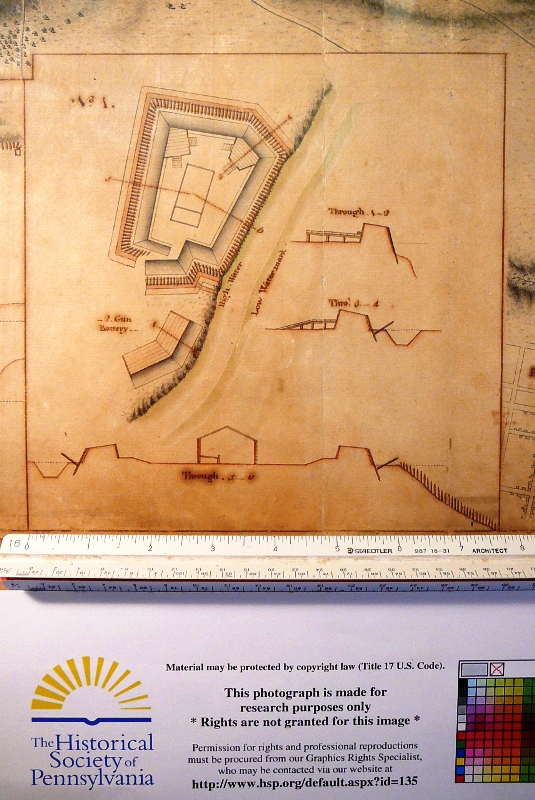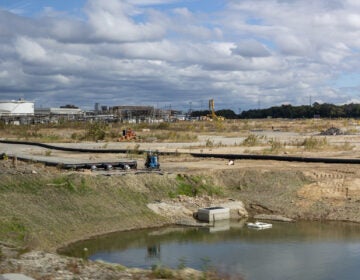Nutter calls for complete casino study

The map (above) shows the exact details and location of British Fort No. 1, which was located on the SugarHouse site.
Jan. 10
By Kellie Patrick Gates
For PlanPhilly
Mayor Michael Nutter’s administration will examine every decision the city has made regarding casinos.
“The administration is doing an in-depth, comprehensive evaluation of everything related to casinos,” Nutter spokesman Doug Oliver said.
Earlier this week, Oliver announced that Nutter had asked new Licenses & Inspections Commissioner John Elfrey to review the process by which SugarHouse Casino received a rough grading permit on the last working day of the Street administration. John Street was an avid casino supporter. Nutter stated publicly throughout his campaign for mayor that he thinks the riverfront is not the right place for SugarHouse or Foxwoods, the city’s other proposed casino.
SugarHouse says the timing of the permits is coincidental – the state Supreme Court recently affirmed they had the zoning needed to build and the Street administration issued the zoning permit, which allowed them to get the rough grading permit. Critics find the timing suspicious.
Oliver said that Nutter will not take any action on a single permit until he has reviewed everything that has happened – a process that will take at least two weeks.
“Some have asked, ‘can you at least do this part now?’ but we need the full picture” to draw conclusions about any one part, he said.
A group of local historians say that’s not soon enough, because the site-preparation work the permit allows could destroy artifacts from the British occupation of Philadelphia and the use of the site by the Lenni-Lenape nation. The Nanticoke Lenni-Lenape Tribal Council reviewed the situation at their meeting earlier this week and determined that the SugarHouse site is a “location of concern”. Earlier stories
“I hope he realizes there is a little bit more on the line than just the future of a casino,” said Hilary Regan, a history buff and member of the Northern Liberties Neighborhood Association.
“I feel like if any other city in the country identified something potentially this important, they would be thrilled, and they would be doing anything they can to make sure there’s adequate preservation.”
Regan and others have asked Nutter to reconsider. PNA.
The rough grading permit allows SugarHouse to do site-preparation work, which is underway. But the permit states that “work shall not commence in the remaining areas of archeological concern until clearance is obtained from the PHMC (Pennsylvania Historical and Museum Commission) and USACE (United States Army Corps of Engineers).”
“We have permission from PHMC to continue current site activities,” said SugarHouse spokeswoman Leigh Whitaker. “That doesn’t seem to be the case to me at all,” said Kirk Wilson, spokesman for the Historical Commission.
The Commission is involved in the SugarHouse case because the project will jut out into the Delaware River. That means the casino needs a permit from the Army Corps of Engineers. Federal law requires that this permit not be issued until a historical review is done to ensure any valuable historic artifacts are protected. In Pennsylvania, the Corps does this with input from the Historical and Museum Commission. It will also take comments from a group of consulting parties, including Regan.
The first meeting of the Corps, the Commission, the consulting parties and SugarHouse is scheduled for Jan. 18. But Historical and Museum Commission officials have already weighed in via email.
“It is the opinion of the State Historic Preservation Office that there should be no ground-disturbing activities on the site other than those related to archaeology until the (historic review) 106 process is over,” wrote Douglas C. McLearen, of the Commission’s Bureau for Historic Preservation, to Terry McKenna, project executive for SugarHouse’s general contractor, on Jan. 7. “We are still in consultation.”
The email was also sent to the Army Corps. “We were the ones that made the recommendation to have any movement of ground stop,” Wilson said. He also said the Commission is only an “advisory agency” and it is up to the Corps to enforce the rules.
An Army Corps spokesman could not provide current information about the Corps’ position on Thursday.
Torben Jenk, a builder and preservationist who has researched Kensington and Fishtown history, Daniel Hunter, co-founder of the anti-casino group Casino-Free Philadelphia, and Regan have sent letters pleading directly to SugarHouse’s McKenna.
When asked if SugarHouse was considering the request, Whitaker said, “The activities taking place on the site are within the scope of valid, legal permits that were issued to us.”
Following the federal historical requirements, SugarHouse is in the process of an archaeological study. After the initial phase was completed, SugarHouse archaeological consultant A.D. Marble recommended more digging be done in select areas where evidence of a neighborhood dating back to the 1700s might be found.
One of the reasons the local historians are so skeptical is that the Phase I report made no mention of a British Fort No. 1, which maps show was located on the site. In a preliminary Phase II report, expected to be complete in time for the Jan. 18 meeting, A.D. Marble said they had since learned of the Fort’s existence, but could find no evidence of it. They recommended no further investigation related to the Fort. They also said they found a few Native American artifacts, but expected to find no more of those, either. Most of the past had already been destroyed by more recent history, they said – the Industrial Age.
The archaeologists did recommend a complete evacuation of some shafts and privies in what were the back yards of the former 18th and 19th century residents.
“We have full confidence in our archaeological consultant,” Whitaker said. “Pursuant to the 106 regulations, if we find something on the site, and we don’t believe we will, it is categorized and sent to the Pennsylvania Historical and Museum Commission.”
While the historians want Nutter to do more, all who oppose casinos outright, want to move them away from the waterfront, or just want the process to slow down, are pleased that Nutter has begun a review.
During his campaign, Nutter publicly said that he opposes the proposed Delaware Riverfront sites. And so many fighting the casinos in one way or another have lobbied him, and have waited to see what he would do once in office.
“We’re happy that Mayor Nutter is taking a close look at all the decisions the Street administration made – we’re happy to have that extra layer of review,” said Brian Abernathy, spokesman for Councilman Frank DiCicco. “We’ve asked him to take some specific actions, and this is part of that.”
SugarHouse officials say they will assist with the review as needed. “We want to foster a good working relationship with the Nutter administration,” spokeswoman Leigh Whitaker said in an email. “As such, we will cooperate with Licenses and Inspections during the course of the review.”
Abernathy, who saw Nutter in action when he was a city councilman, said this is in keeping with Nutter’s deliberative personality. “He does nothing without facts and figures on the table,” Abernathy said. “This mayor is not someone to act immediately on impulse or because someone tells him to do something.”
Said Oliver: “We’ll take our next step as soon as possible after the completion of our comprehensive review.”
SugarHouse plans to be finished with the first phase of project construction, which includes the casino itself, in fall 2009.
WHYY is your source for fact-based, in-depth journalism and information. As a nonprofit organization, we rely on financial support from readers like you. Please give today.






